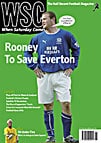 The Miracle of Bern was a massive commercial success in Germany, and its London viewing was a sell-out. Errol Lawrence, who despises many other samples of sport on the big screen, believes it could be the best film ever of its kind
The Miracle of Bern was a massive commercial success in Germany, and its London viewing was a sell-out. Errol Lawrence, who despises many other samples of sport on the big screen, believes it could be the best film ever of its kind
Soenke Wortmann’s The Miracle of Bern stopped over in London at the end of November to open the annual German Film Festival. The film has become a huge commercial success in Germany and won praise across Europe and such is its reputation that the film’s single screening in London was a sell-out, attracting a polyglot audience of native Germans, students, film buffs and even the odd football fan.
The film tells the story of a football-obsessed boy who worships local player Helmut Rahn and whose world is turned upside-down by the return from Russian prison of the father he never knew. Football is woven into the everyday life of the industrial Ruhr of 1954 and the film spotlights the tumultuous World Cup victory that invigorated West Germany and signalled the nation’s rebirth. Obviously, the period in which the film is set has significance for Germans of all ages – witness the recent popular poll which placed Konrad Adenauer, the first post-war chancellor, ahead of Goethe, Einstein, Marx and company as the greatest German of all time. But does it work for those who do not have an obvious cultural and historical connection to the events portrayed?
On the whole, it does. The film certainly passes muster in successfully evoking a time and an historical place fundamental to any understanding of the modern Germany. Making an 11-year-old boy the protagonist and thereby filtering events through an innocent too young to be implicated in, or aware of, the dark political backdrop enables the avoidance of difficult questions and adds to the charm of the piece. This evocation of post-war Germany is quite subtle. The misery, hardship and desolation are not laid on thickly and although the soft focus may raise a few eyebrows it is in keeping with the sentimental strain which runs through the film.
For once, the football works, too. It’s woven into the human story without overshadowing it – the “miracle” of the title referring as much to the ultimate reconciliation of father and son as the unexpected sporting victory. The casting certainly helps: doppelgängers for coach Sepp Herberger and striker Fritz Walter have been found and a suitably chubby left-footer appears as Ferenc Puskas; the inclusion of the character of Adi Dassler along with his revolutionary screw-in studs is a generous nod to an aspect of football and commercial history which is usually ignored.
Before the screening, an announcer explained that, while the human story is fictional, everything presented on the pitch actually happened. This is more or less true, although the odd liberty is taken. West Germany’s initial heavy loss to Hungary is featured, but there is no mention of the almost certainly deliberate and decisive clogging of Puskas in that game. There is no sign of Hungary’s last-minute equalising “offside” goal in the final. We also do not have the playing of Deutschland Über Alles after the final as happened in 1954. These are relatively minor complaints, though – and why should the film-makers want to evince sympathy for those magnificent Hungarians anyway?
The match action is good with real footballers used as actors rather than the other way around, which always helps, and the decisive scenes in the final – familiar to all Germans – are presented well. The use of Herbert Zimmermann’s legendary radio commentary – the German equivalent of Kenneth Wolstenholme in the 1966 World Cup final – enhances the authentic feel.
For all that, the most affecting football scenes are perhaps those featuring the children playing on waste ground and in grim backstreets. That picture of grubby children in short trousers and hand-me-down shoes playing football as though nothing else in the world matters is so familiar as to be almost cliched – but it works nonetheless.
Football on the big screen does not have a proud record, but The Miracle of Bern definitely joins a select group of films which are not an obvious embarrassment to the game. Indeed, it may even be the best ever.
From WSC 203 January 2004. What was happening this month